The Gaza war raged on into a fourth month on Sunday as the Israeli army pounded the Palestinian territory with strikes and US top diplomat Antony Blinken was back in the Middle East seeking to avoid a wider escalation.
Israeli bombardments had killed at least 113 people in the past 24 hours, said the health ministry in the besieged territory run by Hamas, with two journalists among the victims when their car was struck in Rafah.
The journalists killed, who were working for Al Jazeera, were identified as Mustafa Thuria, a video stringer who also worked for AFP and other media, and Hamza Wael Dahdouh, the son of the Qatari network's Gaza bureau chief who earlier lost his wife and two other children in an Israeli strike.
"Hamza was everything for me," Dahdouh said on Al Jazeera television, adding that "I hope that the blood of my son Hamza is the last blood to flow of journalists as well as people in the Gaza Strip".
Air strikes also claimed civilian lives in the southern cities of Khan Yunis and in Rafah where many displaced people have sought refuge, AFP correspondents reported.
"These three months have been like a quarter of a century," said one Gaza resident, Nabil Fathi, 51. "I wake up thinking this is a passing nightmare, but it is a reality.
"Our home and my son's home have been destroyed and we have 20 people martyred in our family. I don't know where we will go even if I survive."
During the Gaza war, violence has also flared between Israel and Lebanon's Iran-backed armed group Hezbollah. They have traded almost daily cross-border fire, forcing Israel to evacuate communities near the border.
Hezbollah on Saturday said it had fired 62 rockets at an Israeli military base, days after it blamed Israel for a strike in Beirut that killed Hamas deputy leader Saleh al-Aruri.
The Israeli military said it had struck Hezbollah "military sites" in response, while army spokesman Daniel Hagari warned the group against "dragging Lebanon into an unnecessary war".
Blinken labelled the flareup in border hostilities a "real concern" and said "we want to do everything possible to make sure that we don't see escalation there".
On his fourth trip to the region since the October 7 attack, he visited Jordan Sunday for talks with King Abdullah II.
The king warned Blinken against the war's "catastrophic repercussions" and of the need to end "the tragic humanitarian crisis" there.
The monarch also reiterated "the important role of the United States in bringing pressure for an immediate ceasefire in Gaza".
Washington has twice exercised its veto at the UN Security Council over ceasefire calls, drawing outrage in the Arab world, but has also urged restraint in Israel's military operation.
Blinken later headed to Qatar. A source with knowledge of the visit said that "negotiations between the Qataris with Israel and Hamas regarding the release of hostages in Gaza are ongoing, although recent events have naturally impacted the atmosphere surrounding the talks".
Deadly violence also flared again in the occupied West Bank, where bloodshed has surged to levels unseen in nearly two decades.
An Israeli strike in the northern city of Jenin killed seven Palestinians Sunday, while an eighth died in a separate incident.
And an Israeli border police officer was killed when a roadside bomb hit her vehicle and an Israeli civilian was also shot dead in another incident, sources on both sides said.
EU foreign policy chief Josep Borrell was also in the region. He met members of Hezbollah's political wing in Beirut on Saturday and was then headed to Saudi Arabia to discuss "a joint EU-Arab initiative" for peace.
Civilians in Gaza have borne the brunt of the conflict that has reduced swathes of the coastal territory to rubble and triggered a deepening humanitarian crisis.
In Jordan, Blinken visited to a World Food Programme aid warehouse where senior UN official Sheri Ritsema-Anderson described the situation in Gaza as "catastrophic".
She said the Gaza war had claimed the lives of more than 140 UN staff, "the single largest number of casualties in any conflict in modern history for the United Nations".
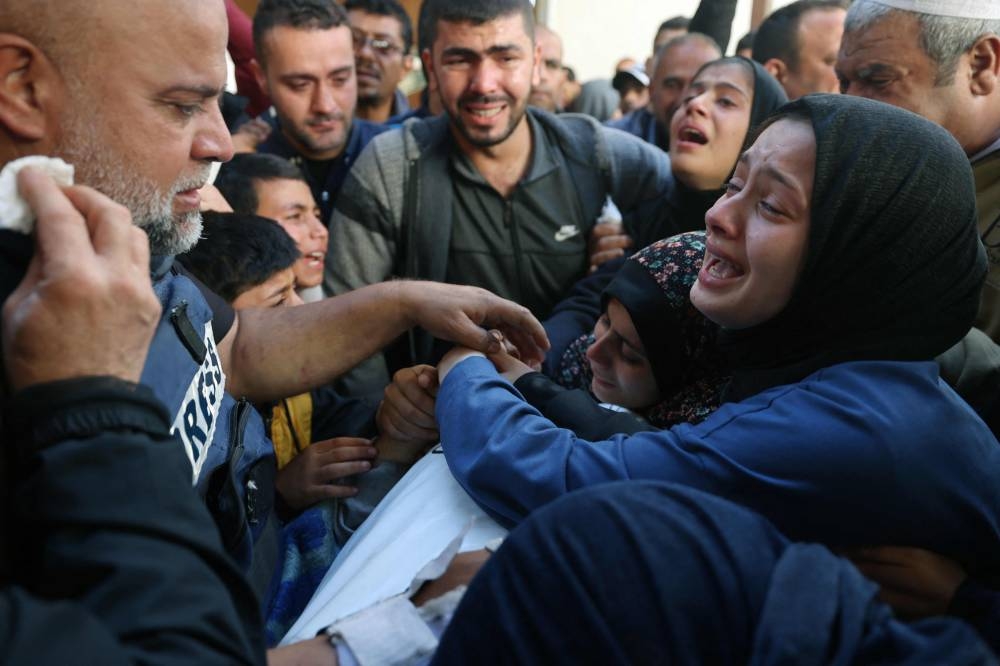
The widow (R) of Hamza Wael Dahdouh, a journalist with the Al Jazeera television network, and his father Al Jazeera's bureau chief in Gaza, Wael Al-Dahdouh (L) mourn over his body during his funeral, after he was killed in a reported Israeli air strike, in Rafah in the Gaza Strip on Sunday. AFP
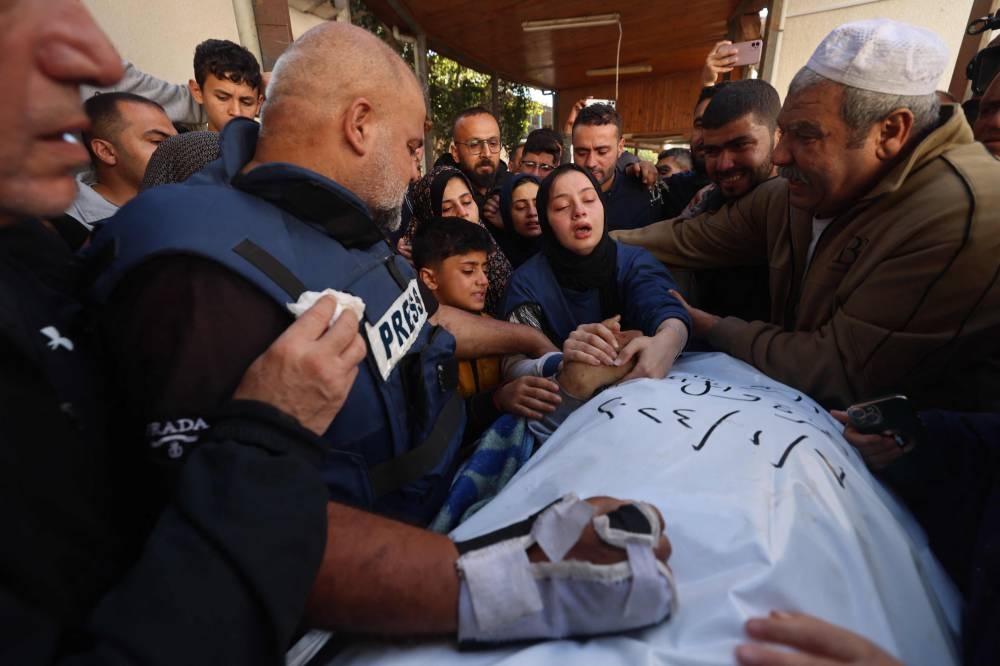
The wife (C) of Hamza Wael Dahdouh, a journalist with the Al Jazeera television network, and his father Al Jazeera's bureau chief in Gaza, Wael Al-Dahdouh (L) mourn over his body during his funeral, after he was killed in a reported Israeli air strike in Rafah in the Gaza Strip on Sunday. AFP
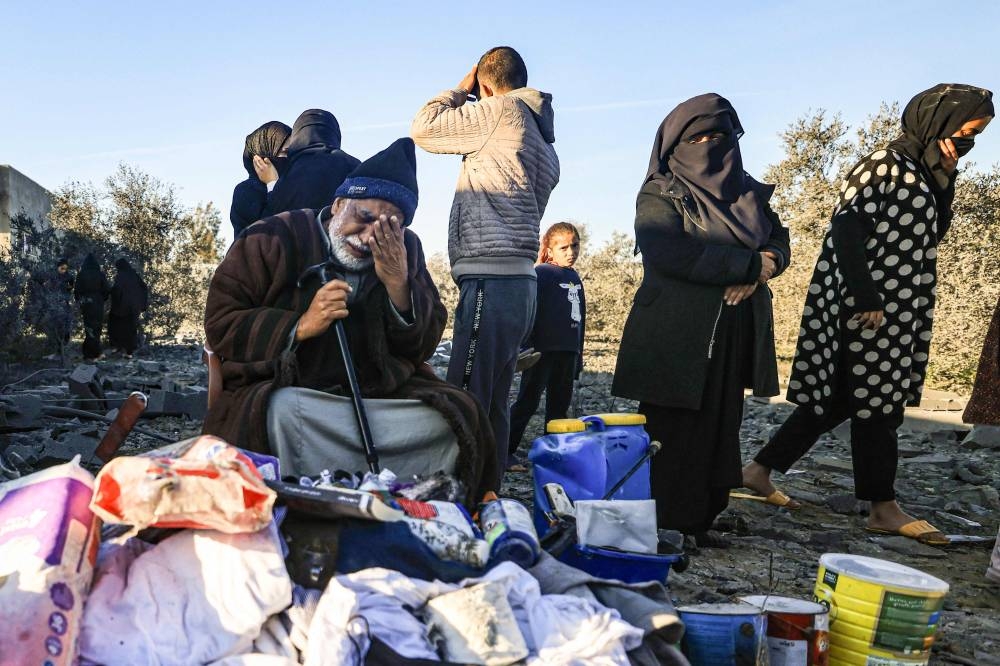
A displaced Palestinian man reacts as he sits among objects salvaged from a house that was used as a shelter by his extended family members, many of whom were reported killed when it was destroyed during an Israeli strike on Rafah in the southern Gaza Strip on Sunday. AFP
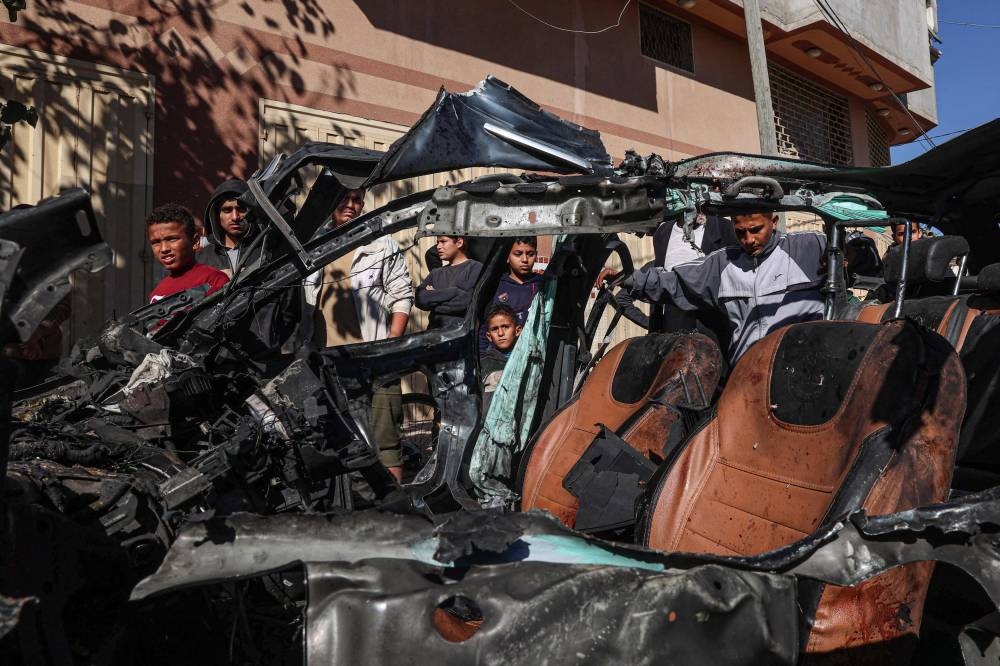
People check the car in which two journalists, Mustafa Thuria, a video stringer for AFP news agency, and Hamza Wael Dahdouh, a journalist with Al Jazeera television network, were killed in a reported Israeli strike in Rafah in the Gaza Strip on Sunday. AFP.
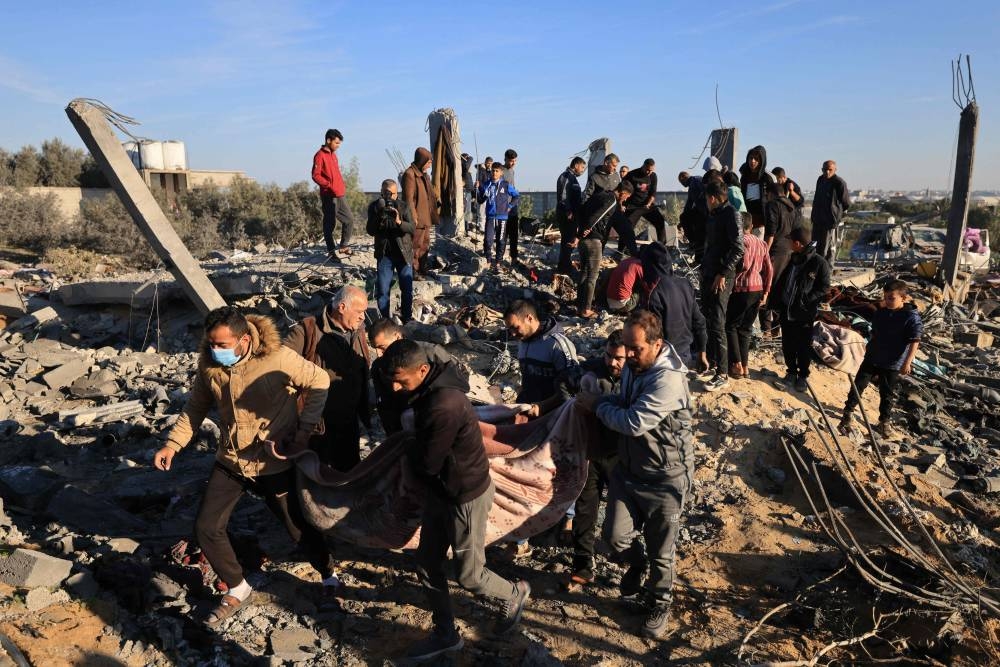
People carry away the body of a victim found under the rubble of a house that was used as a shelter by a displaced Palestinian family, many of whom were reported killed when it was destroyed during an Israeli strike on Rafah in the southern Gaza Strip on Sunday. AFP
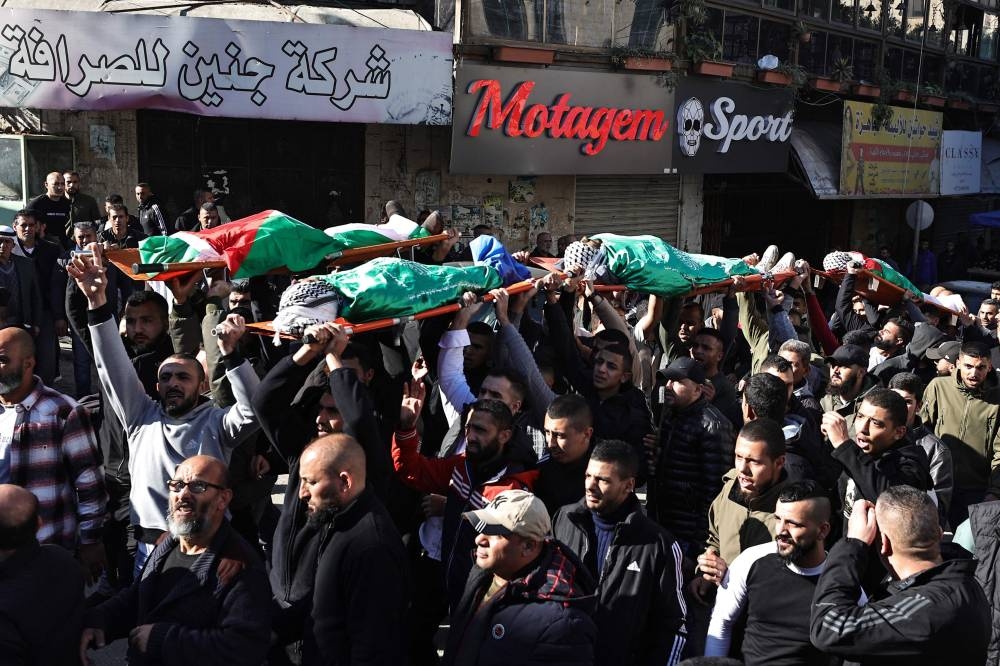
Mourners carry the flag-draped bodies of Palestinians killed during an Israeli raid in Jenin in the occupied West Bank, during their funeral on Sunday. AFP
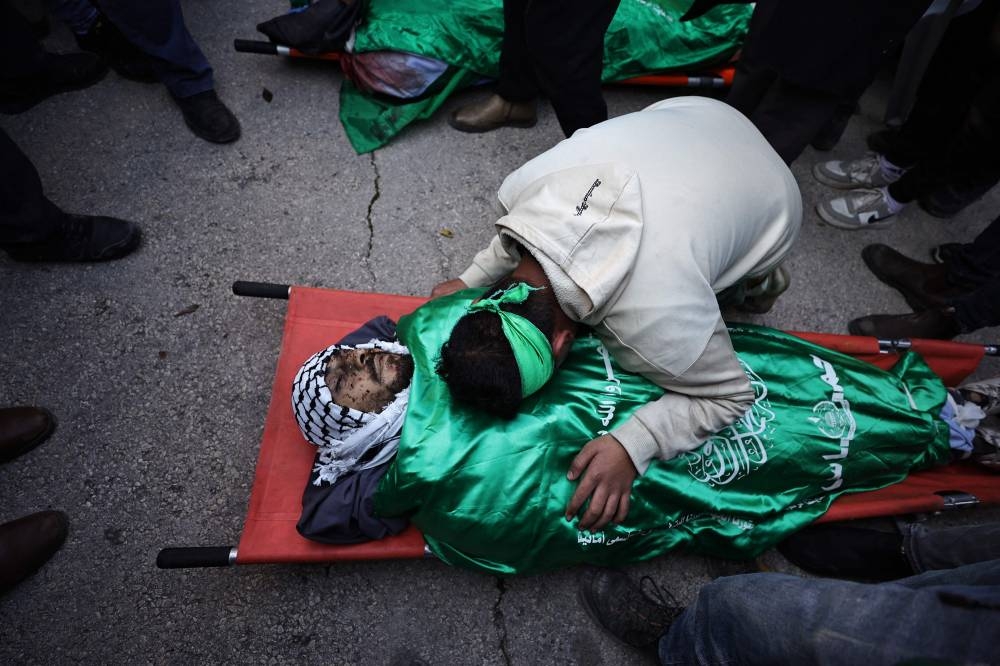
A man mourns over the flag-draped bodiy of one of six Palestinians killed during an Israeli raid in Jenin in the occupied West Bank, during their funeral on Sunday. AFP
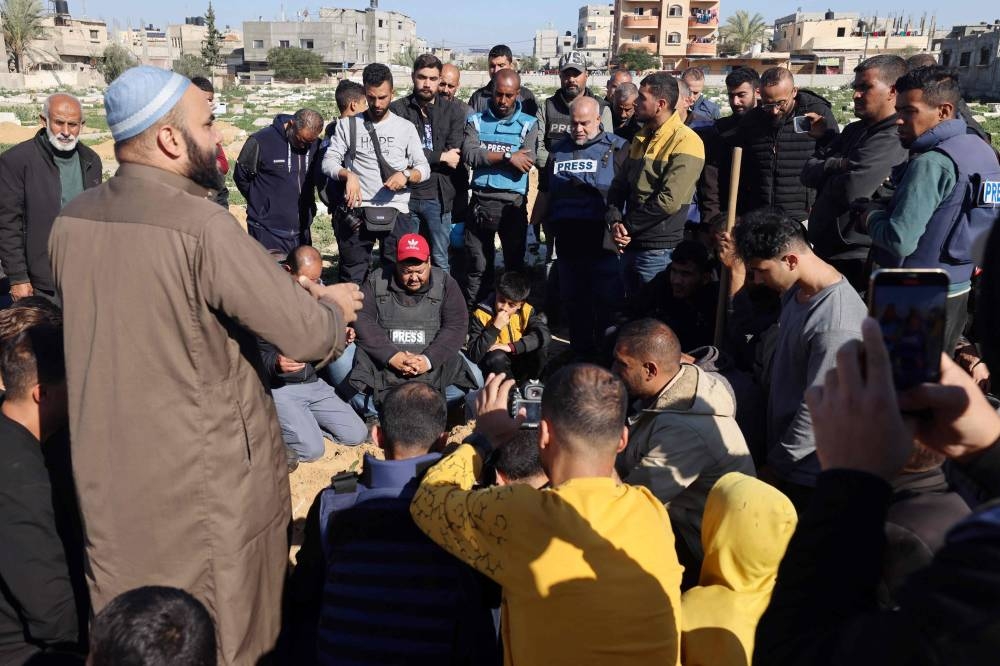
Al Jazeera's bureau chief in Gaza, Wael Al-Dahdouh (C), along with fellow journalists, mourn during the funeral of his son Hamza Wael Dahdouh, a journalist with the Al Jazeera television network, who was killed in a reported Israeli air strike, in Rafah in the Gaza Strip on Sunday. AFP
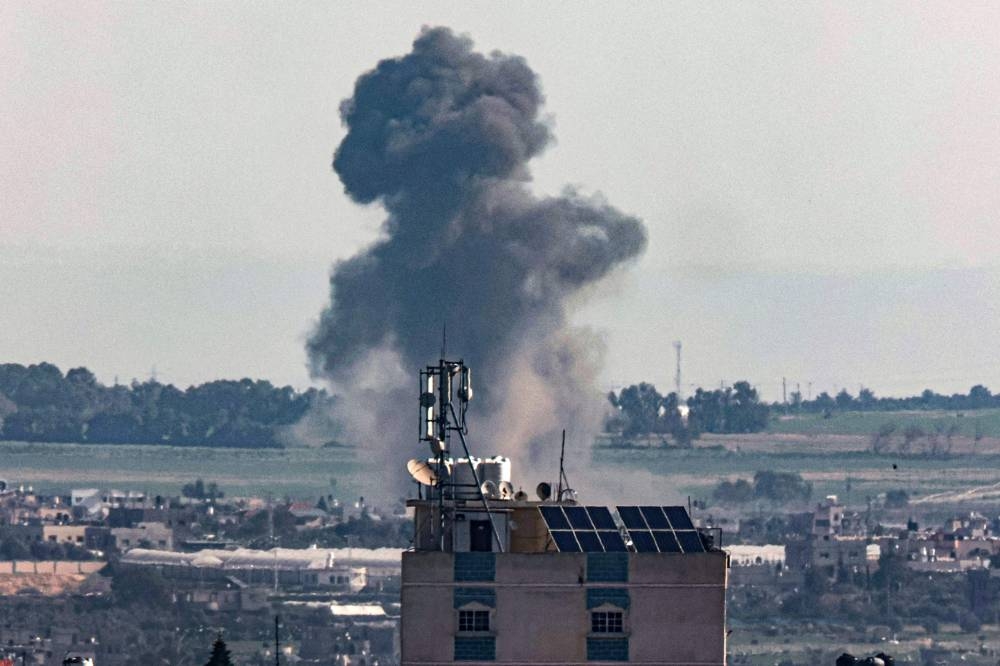
A picture taken from Rafah on Sunday, shows smoke billowing over Khan Yunis in the southern Gaza Strip during Israeli bombardment, amid continuing battles between Israel and the Palestinian militant group Hamas. AFP
